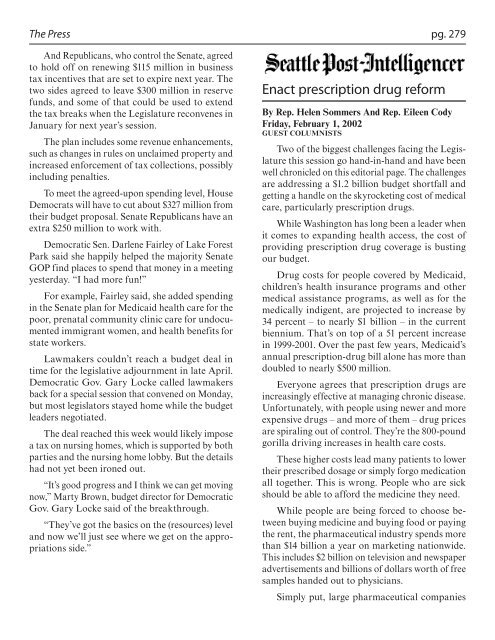Helen Sommers: An Oral History
Helen Sommers: An Oral History
Helen Sommers: An Oral History
You also want an ePaper? Increase the reach of your titles
YUMPU automatically turns print PDFs into web optimized ePapers that Google loves.
The Press<br />
<strong>An</strong>d Republicans, who control the Senate, agreed<br />
to hold off on renewing $115 million in business<br />
tax incentives that are set to expire next year. The<br />
two sides agreed to leave $300 million in reserve<br />
funds, and some of that could be used to extend<br />
the tax breaks when the Legislature reconvenes in<br />
January for next year’s session.<br />
The plan includes some revenue enhancements,<br />
such as changes in rules on unclaimed property and<br />
increased enforcement of tax collections, possibly<br />
including penalties.<br />
To meet the agreed-upon spending level, House<br />
Democrats will have to cut about $327 million from<br />
their budget proposal. Senate Republicans have an<br />
extra $250 million to work with.<br />
Democratic Sen. Darlene Fairley of Lake Forest<br />
Park said she happily helped the majority Senate<br />
GOP find places to spend that money in a meeting<br />
yesterday. “I had more fun!”<br />
For example, Fairley said, she added spending<br />
in the Senate plan for Medicaid health care for the<br />
poor, prenatal community clinic care for undocumented<br />
immigrant women, and health benefits for<br />
state workers.<br />
Lawmakers couldn’t reach a budget deal in<br />
time for the legislative adjournment in late April.<br />
Democratic Gov. Gary Locke called lawmakers<br />
back for a special session that convened on Monday,<br />
but most legislators stayed home while the budget<br />
leaders negotiated.<br />
The deal reached this week would likely impose<br />
a tax on nursing homes, which is supported by both<br />
parties and the nursing home lobby. But the details<br />
had not yet been ironed out.<br />
“It’s good progress and I think we can get moving<br />
now,” Marty Brown, budget director for Democratic<br />
Gov. Gary Locke said of the breakthrough.<br />
“They’ve got the basics on the (resources) level<br />
and now we’ll just see where we get on the appropriations<br />
side.”<br />
Enact prescription drug reform<br />
pg. 279<br />
By Rep . <strong>Helen</strong> <strong>Sommers</strong> <strong>An</strong>d Rep . Eileen Cody<br />
Friday, February 1, 2002<br />
GUEST COLUMNISTS<br />
Two of the biggest challenges facing the Legislature<br />
this session go hand-in-hand and have been<br />
well chronicled on this editorial page. The challenges<br />
are addressing a $1.2 billion budget shortfall and<br />
getting a handle on the skyrocketing cost of medical<br />
care, particularly prescription drugs.<br />
While Washington has long been a leader when<br />
it comes to expanding health access, the cost of<br />
providing prescription drug coverage is busting<br />
our budget.<br />
Drug costs for people covered by Medicaid,<br />
children’s health insurance programs and other<br />
medical assistance programs, as well as for the<br />
medically indigent, are projected to increase by<br />
34 percent – to nearly $1 billion – in the current<br />
biennium. That’s on top of a 51 percent increase<br />
in 1999-2001. Over the past few years, Medicaid’s<br />
annual prescription-drug bill alone has more than<br />
doubled to nearly $500 million.<br />
Everyone agrees that prescription drugs are<br />
increasingly effective at managing chronic disease.<br />
Unfortunately, with people using newer and more<br />
expensive drugs – and more of them – drug prices<br />
are spiraling out of control. They’re the 800-pound<br />
gorilla driving increases in health care costs.<br />
These higher costs lead many patients to lower<br />
their prescribed dosage or simply forgo medication<br />
all together. This is wrong. People who are sick<br />
should be able to afford the medicine they need.<br />
While people are being forced to choose between<br />
buying medicine and buying food or paying<br />
the rent, the pharmaceutical industry spends more<br />
than $14 billion a year on marketing nationwide.<br />
This includes $2 billion on television and newspaper<br />
advertisements and billions of dollars worth of free<br />
samples handed out to physicians.<br />
Simply put, large pharmaceutical companies
















